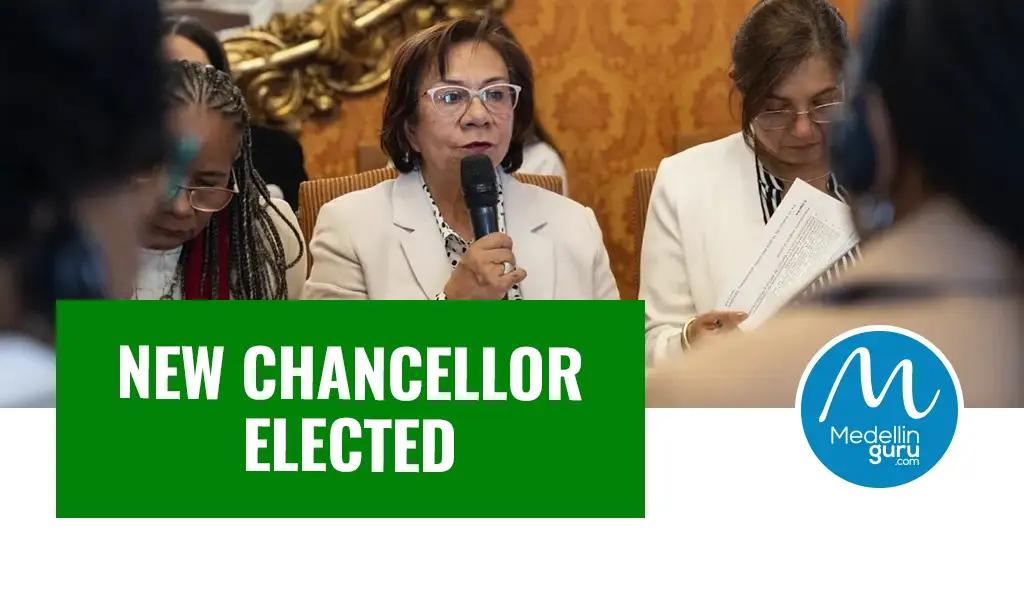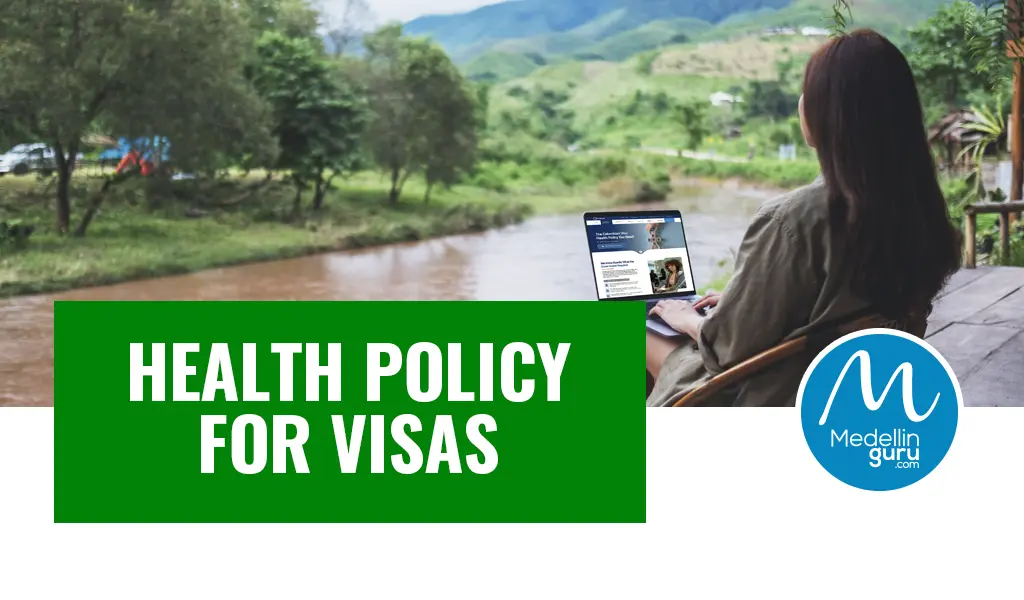Colombia is currently experiencing an internal crisis in the Ministry of Foreign Affairs due to the passport issue and the awarding of a contract to continue maintaining passport production, thus preventing a shortage that affects thousands of citizens. This led to the resignation of the then Foreign Minister, Laura Sarabia, amidst controversial statements from the National Government.
In addition to this, the situation drew strong criticism from various sectors, including the Procuraduría General de la Nación, which initiated investigations and warned about the risks to the service, adding to other complaints about the quality of consular services.
Currently, Rosa Villavicencio has assumed the vacant position as the new Chancellor elected in the Ministry of Foreign Affairs and takes on the great challenge of stabilizing one of the most important departments within the National Government, aiming to maintain its national efficiency and the country’s good international reputation.
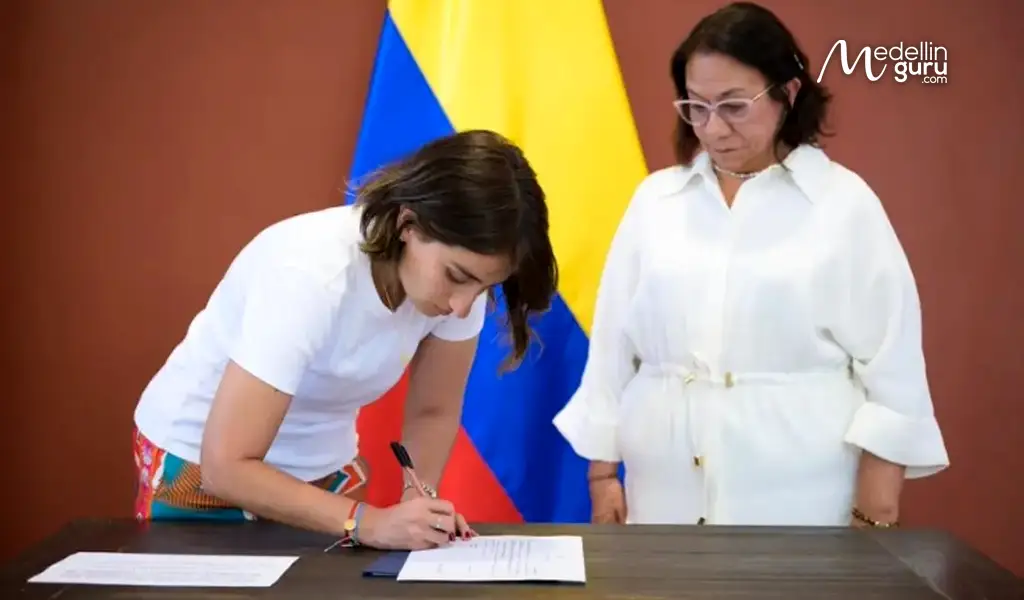
What is the Mess with the Passports that led to a New Chancellor Elected?
The passport issue that Colombia is currently experiencing, which has led to a new chancellor elected, is due to the Colombian Government’s proximity to September 1st — the date on which the extension of the contract with Thomas Greg & Sons expires. This company currently holds the tender for the production and manufacture of Colombian passports.
This situation opened the possibility of having a new supplier who would not only need a reasonable amount of time for training and handover, but has also been questioned due to the interference of political intrigues that could influence this decision — one that has the country on edge.
To better understand this situation, let’s start with a short timeline that puts it relevance into context:
Timeline related to Passport Crisis in Colombia
The Chancellery decided to "suspend the public tender process" for the issuance of Colombian passports and visa labels because other interested companies argued that there was no fair competition, since in the last 17 years the same company, Thomas Greg & Sons, has been responsible for producing these documents, and declared the call for bids won by that company null and void.
After that decision, the Procuraduría General (which oversees the Public Ministry) opened an investigation on September 12 of that year against then-Foreign Affairs Minister Álvaro Leyva and against the Secretary-General of the Foreign Affairs Ministry, José Antonio Salazar, for irregularities in the cancellation of the bidding process.
Twenty days later, Leyva stated that "the figure of manifest urgency was invoked" to extend the contract in question, while the process of "immediately calling for a new, fully guaranteed bid" is carried out to avoid delays in passport issuance.
Given that it had a valid contract with the Government, Thomas Greg & Sons filed a lawsuit in December 2023 against the resolution that declared the passport tender void and is demanding 107,507 million pesos (about 27 million US dollars today) from the Colombian State.
On January 29, 2025, the company reported that it had withdrawn the lawsuit because it was asked to continue manufacturing passports while a definitive decision was made. The announcement was made the same day Laura Sarabia assumed office as Minister of Foreign Affairs.
The Procuraduría General de la Nación found that Leyva committed two disciplinary infractions by declaring the 2023 bidding process void without proper grounds and by extending the current contract under "manifest urgency" without valid reasons. On January 24, 2024, he was suspended from his ministerial position for three months, and in November, he was dismissed and barred from public office for 10 years due to the lack of legal basis for his passport decisions.
To replace Thomas Greg & Sons, Leyva's successor, Luis Gilberto Murillo, signed a ten-year agreement with the Government of Portugal on October 2, 2024, to begin producing the new passports starting September 1, 2025.
The Colombian partner in this agreement is the Imprenta Nacional, a state-owned company whose technical capacity to produce passports and documents that require special security conditions has been questioned by experts.
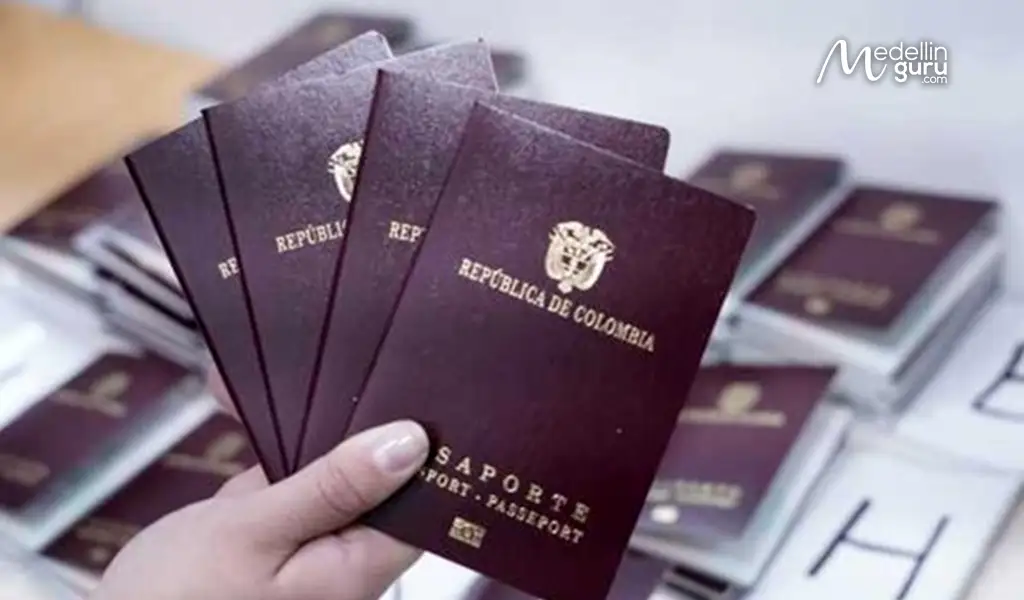
Upon arriving at the Foreign Ministry, Laura Sarabia inherited two ongoing processes: a memorandum of understanding with Portugal, which had no immediate commercial implications, and an extension of the declared urgency signed with Thomas Greg & Sons to ensure continuity in passport issuance. This latter contract stipulates that it will end when available booklets are exhausted or on August 31, whichever occurs first.
After evaluating the operational capacity of the National Printing Office and the terms of the eventual agreement with Portugal, the Foreign Ministry concluded that the most viable option was to temporarily renew the contract with Thomas Greg & Sons. However, everything took a different turn with the arrival of the new Chief of Staff of the National Government, Alfredo Saade.
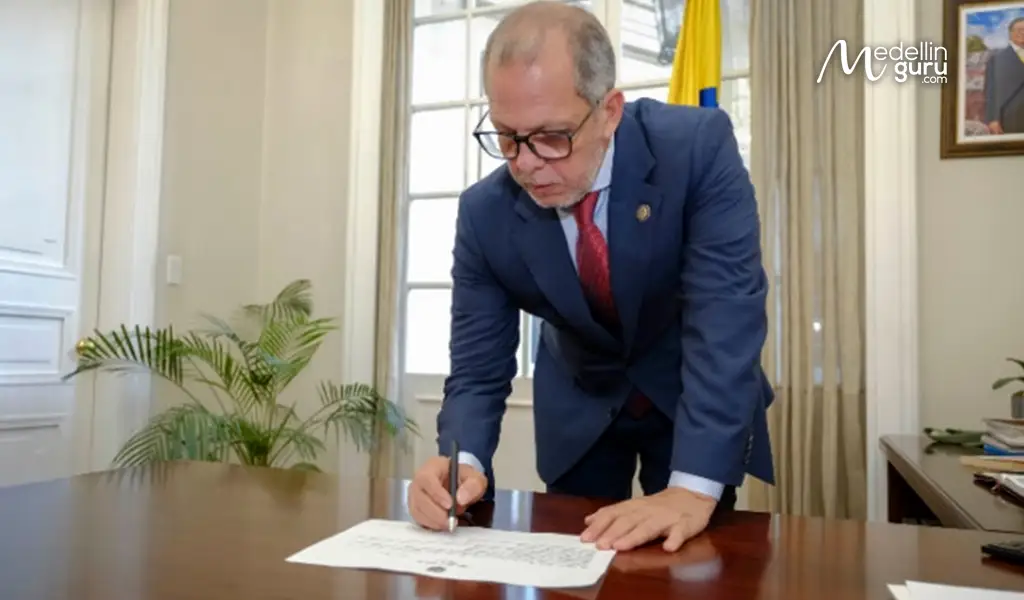
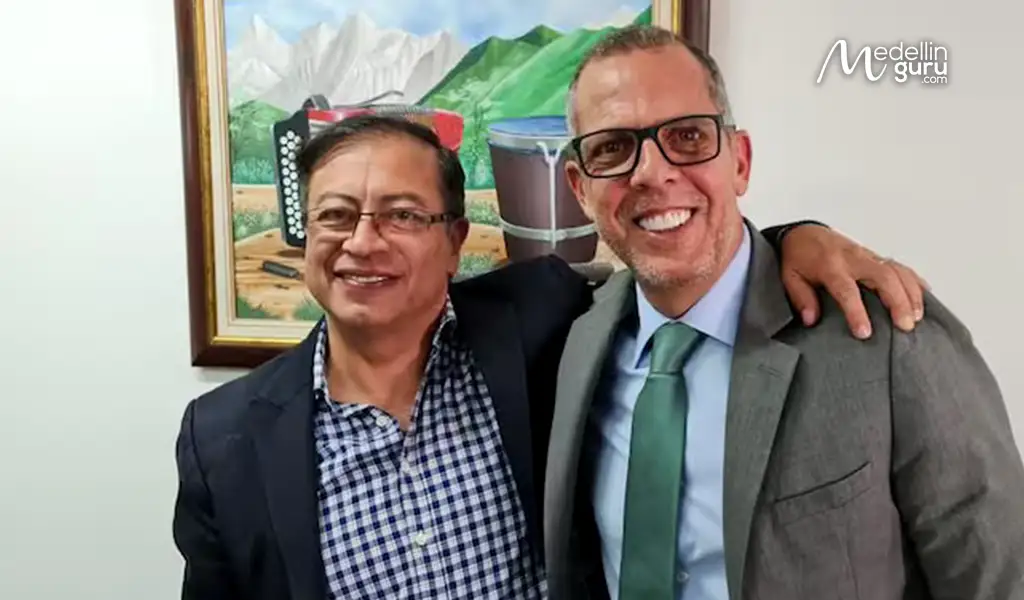
What Happens After Alfredo Saade's intervention?
All of the situations involved renewing the contract with Thomas Greg & Sons for eleven months. Still, on Wednesday, July 2nd, Petro’s new Chief of Staff, Alfredo Saade, countermanded Sarabia and announced that the new agreement between the National Printing Office and the Bank of Portugal will take effect on September 1st.
According to Saade, the Presidency guarantees “that the National Printing Office is ready, what has happened is that they have wanted to overshadow it,” and he assured that the Government “has not signed anything at all, only with Thomas Greg & Sons” to extend the contract.
However, according to Sarabia, Saade opposed that extension and, without legal authority, issued orders that went against the ministerial guidelines. According to the former minister, Saade asked her team to delay the scheduling of appointments for passport issuance in order to extend the remaining inventory duration. “My team let me know that Mr. Saade ordered them to delay the appointment scheduling to ‘make the passports last longer,’” she said.
Sarabia also questioned the announcement made by Saade regarding a supposed imminent signing of a contract with Portugal. She indicated that, after the announcement, she received a communication from the Portuguese embassy stating they were unaware of the contract’s terms and expressing concern over the statements made by the chief of staff.
“According to them, they do not know which contract is being referred to, and, as a result, they are not ready to sign something they do not know about,” she assured.
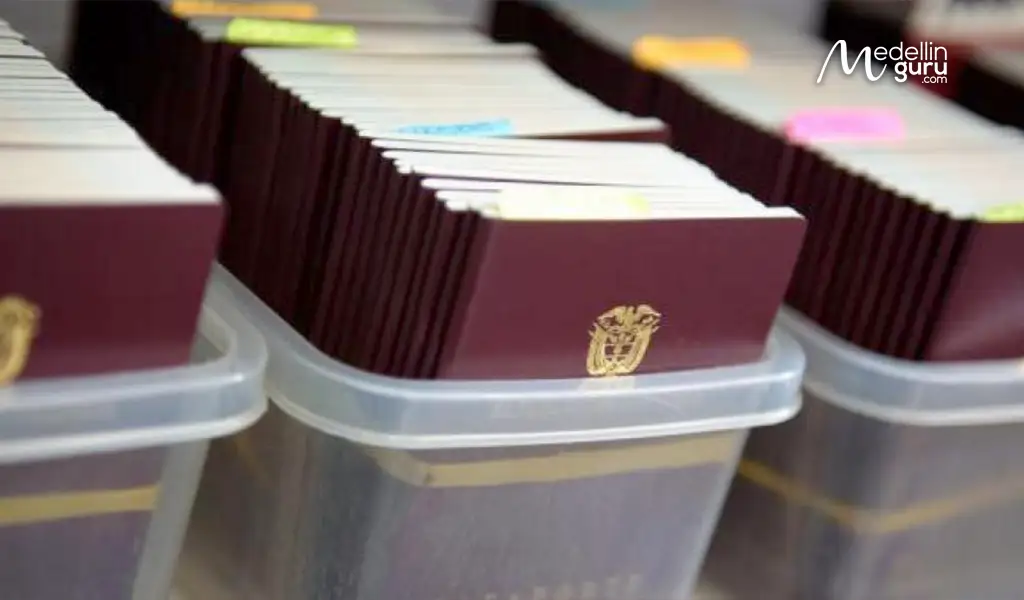
In light of this situation, Laura Sarabia decided to step aside and submit her resignation, stating that she could not deceive the president and the country by maintaining the lie that the printing press would be ready within two months, leaving the Ministry of Foreign Affairs in a difficult position and facing an imminent crisis as the renewal of the bidding process approaches— a scenario where the outlook remains quite unclear.
“In recent days, decisions have been made that I do not agree with and that, out of personal integrity and institutional respect, I cannot support. It is not about minor differences or about who is right. It is about a direction that, with all the affection and respect I have for you, I can no longer carry out,” Sarabia stated to Petro in his resignation letter.
What Have Been the Consequences of This Passport Mess?
In the nearly three years that President Gustavo Petro has been in office, several Colombian politicians have accepted the opportunity to serve as officials in his administration and accompany him as head of state. In this way, three individuals have assumed leadership of the Ministry of Foreign Affairs: Álvaro Leyva Durán, Luis Gilberto Murillo Urrutia, and Laura Camila Sarabia Torres.
This is unusual and undoubtedly sets a precedent in various processes carried out and provided by the Ministry of Foreign Affairs, as it demonstrates an instability that has negatively impacted several services — affecting not only local responsibilities but also international public opinion regarding this department of the National Government. Some of these shortcomings have been:
Deterioration in consular services
The crisis faced by Colombian consulates abroad was revealed in recent weeks, after thousands of compatriots reported being unable to renew their passports. The issue, affecting diplomatic representations in countries such as Spain, the United States, Italy, Panama, and Australia, was acknowledged by the Ministry of Foreign Affairs itself, which stated that solutions could take up to six months to implement.
The lack of staff, insufficient material resources, and an overwhelming demand keep hundreds of people without access to an essential document for mobility, immigration procedures, work, and academic purposes. This situation originates from various factors, such as the growth of the Colombian population abroad — which in certain cities has increased significantly in recent years — combined with the lack of modernization in service systems and the precarious staffing levels at consular offices.
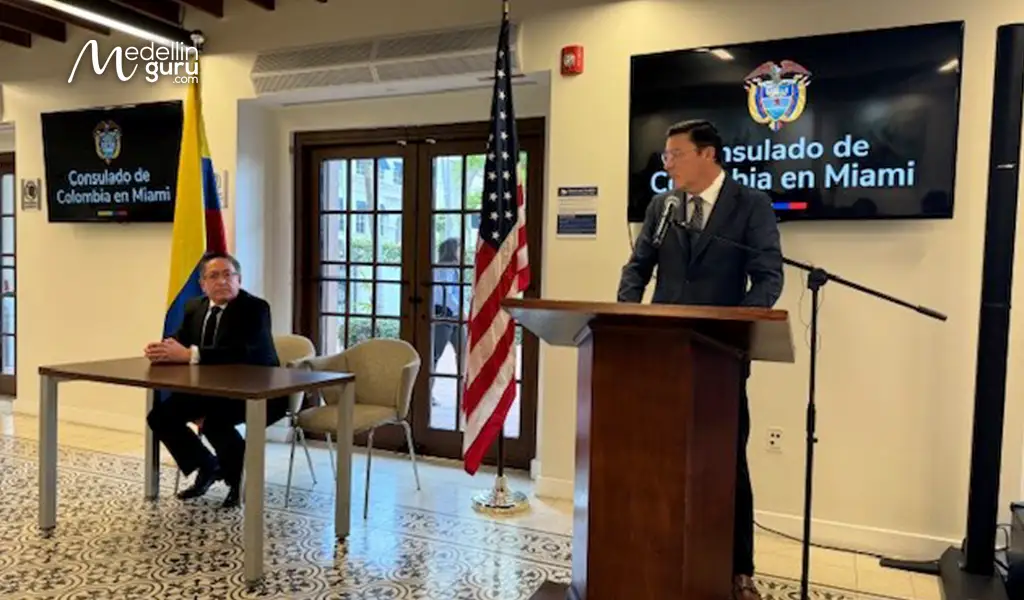
Increase in Inadmissibility of Colombian Visas Without Clear Reasons
On the migration front — and in partnership with our trusted partner, expatgroup.co — we have observed in recent months, with concern, a significant increase in the number of inadmissibility cases for Visitor Visa applications and, more recently, for Digital Nomad Visas and other Migrant Visas.
This strictness, which was previously applied mainly to entrepreneurs, is now becoming common even for individuals applying under an established contract, with no changes or improvements to their application. This phenomenon is generating uncertainty and frustration among applicants, as well as a negative impact on Colombia’s perception as a welcoming and open destination for international investment and talent, as these inadmissibility decisions are often classified under “discretionary authority,” leaving applicants without explanations or stating that the applicant’s profession is not of national interest, without further context.
The lack of clarity regarding the inadmissibility criteria and the apparent discretion in decisions are contributing to an atmosphere of distrust. It is essential to analyze the underlying causes of this increase, which could range from a stricter review of requirements to changes in immigration policy or the interpretation of regulations by consular and migration authorities.
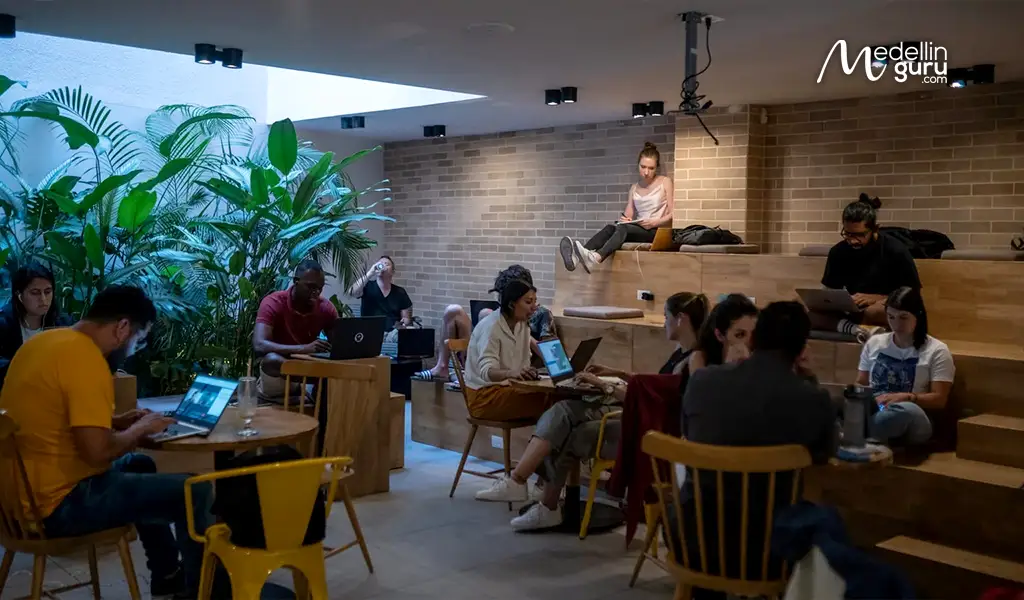
Periods of Unavailability at the Ministry of Foreign Affairs
The passport crisis has had a direct and negative impact on the quality and availability of consular services. Citizens have faced significant delays in the issuance and renewal of passports, which has caused inconvenience for urgent travel, visa procedures, and other essential processes. The responsiveness of consulates has diminished, with long lines and appointments that are difficult to obtain.
However, the crisis has not only affected consular services but also generated periods of unavailability and disruptions in the general functioning of the Ministry of Foreign Affairs. This has led to interruptions in other diplomatic and consular procedures, impacting the country’s ability to manage its international relations and protect the interests of its citizens abroad.
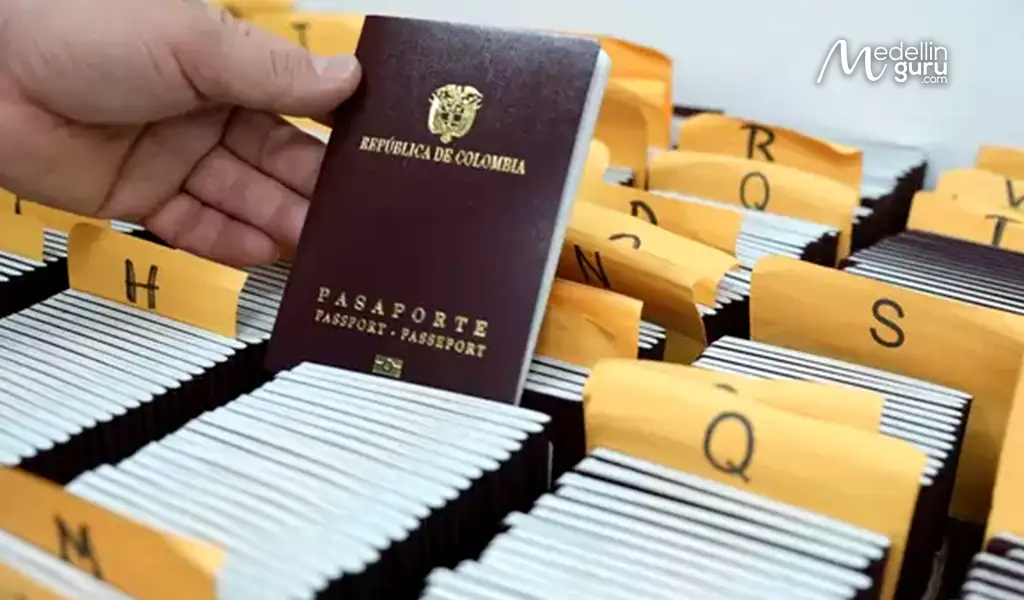
What Lies Ahead for the Country with a New Chancellor Elected?
After the confirmation of Laura Sarabia’s departure as the country’s Chancellor — following her participation in a July 8th meeting with President Gustavo Petro at the Casa de Nariño — the former official assured that she would immediately begin the transition process with Rosa Villavicencio, who had been serving as Deputy Foreign Affairs Minister, and is set to assume the role of Acting Chancellor during transitional period.
Who is Rosa Villavicencio, the Newly Elected Chancellor?
Rosa Villavicencio is a Colombian-Spanish citizen and an economist from the Universidad Cooperativa de Colombia, with a specialization in International Cooperation for Development (Universidad Complutense de Madrid) and a master’s degree in Migration and Intercommunity Relations.
Her career highlights include her work with migrant populations and her close affiliation with Colombia Humana, the movement led by Petro. She was secretary-general of the NGO AESCO and, between 2015 and 2016, worked as a contractor for the Secretaría Distrital de Gobierno in Bogotá.
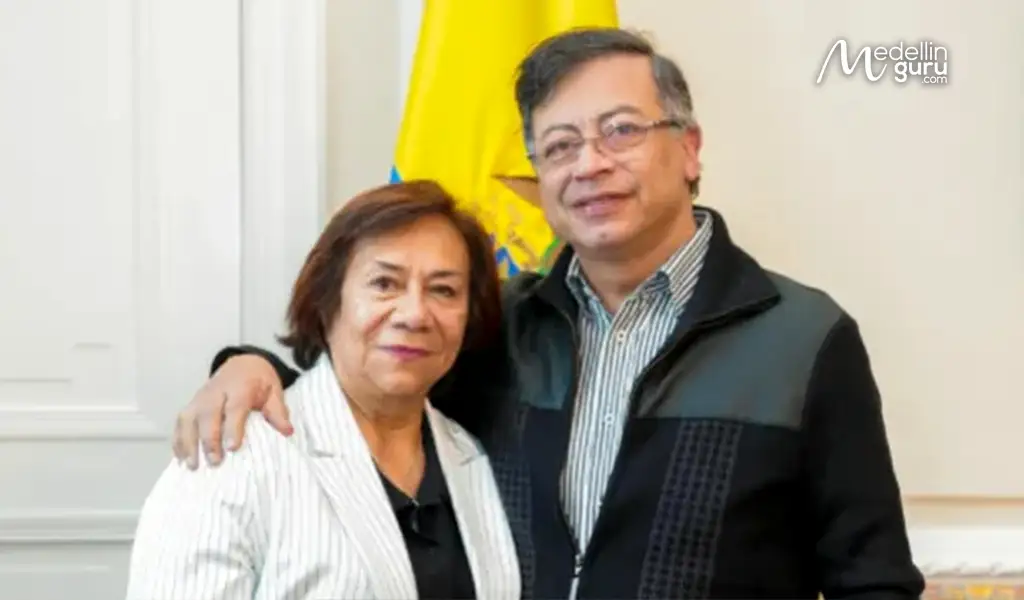
Challenges Ahead
The new chancellor takes office at a critical moment, as in less than two months, on September 1st, the current contract with Thomas Greg & Sons for passport issuance will expire. The Ministry of Foreign Affairs has acknowledged, through a formal communication, that it will not be possible to launch the new passport model by that date.
“The schedule includes several adjustments regarding the implementation of the new passport booklet model,” says the document sent to Senator Angélica Lozano, which details that “a factor affecting the schedule is the time required by the National Printing Office and the Mint to begin operations, which, according to information provided by these entities, could take up to 35 weeks once the agreement is signed.”
For now, the newly appointed chancellor, Rosa Villavicencio, is expected to face her first political oversight debate in Congress, convened by members of the Second Committee of the House of Representatives, who are questioning the Petro Government’s lack of preparedness to implement the new passport model and are demanding answers regarding possible delays and a lack of clarity in the process. This political oversight session will be held on Sunday, July 20.
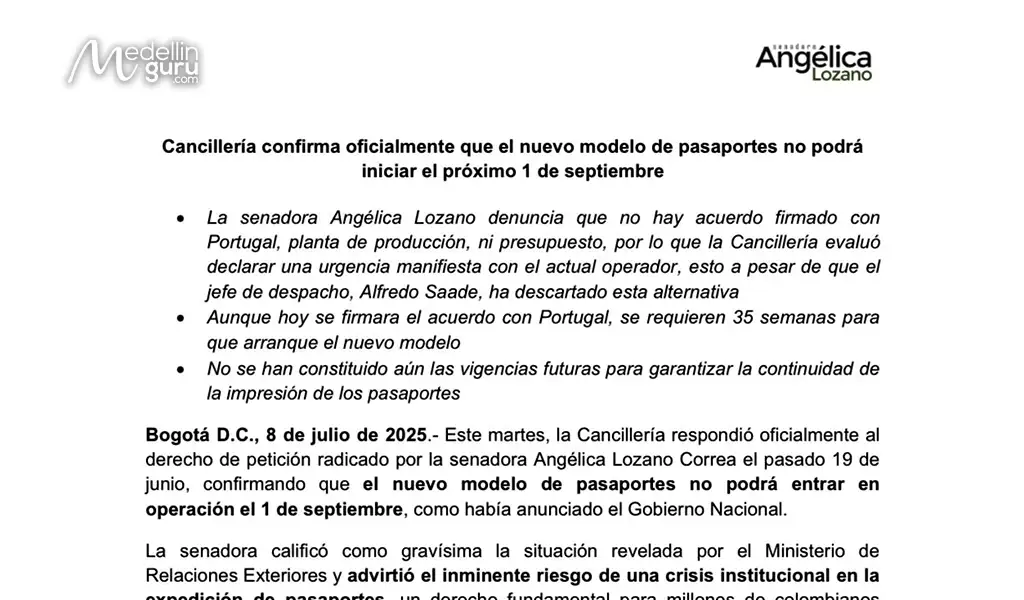
A Ray of Hope
EL TIEMPO’s Investigative Unit exclusively revealed that the agreement—whose term extends until December 31, 2034—was signed and uploaded to SECOP (the transactional platform for managing all Contracting Processes online, with public domain accounts for entities and suppliers) without announcement on the night of Friday, July 18, one month and 10 days before the contract with Thomas Greg & Sons expires (on August 31), where the inter-administrative agreement between the Foreign Affairs Ministry and the National Printing Office is given for the implementation of the new passport model.
According to the 9-page document, the agreement will be in effect until December 31, 2034, and its main objective will be “to unify administrative and technical efforts for the implementation of the new passport service model regarding the supply and personalization of passport booklets and Colombian visa labels with a mechanical reading zone, including the custody and delivery of the final document at the locations designated by the Ministry of Foreign Affairs, with the National Printing Office of Colombia acting as the executor”.
The agreement does not have direct resources for its implementation; instead, the Ministry of Foreign Affairs and the National Printing Office will annually allocate funds for derivative contracts according to technical conditions. Both entities have a joint obligation to provide the necessary technical, legal, operational, technological, and financial means to operate the new model, in addition to creating a Technical Committee to oversee the execution and guide the signing of contracts, where the National Printing Office must inform the Rotating Fund of the Ministry of Foreign Affairs of the implementation schedule for the new model, which must not exceed March 31, 2026, to ensure the supply of booklets starting from April 1, 2026.
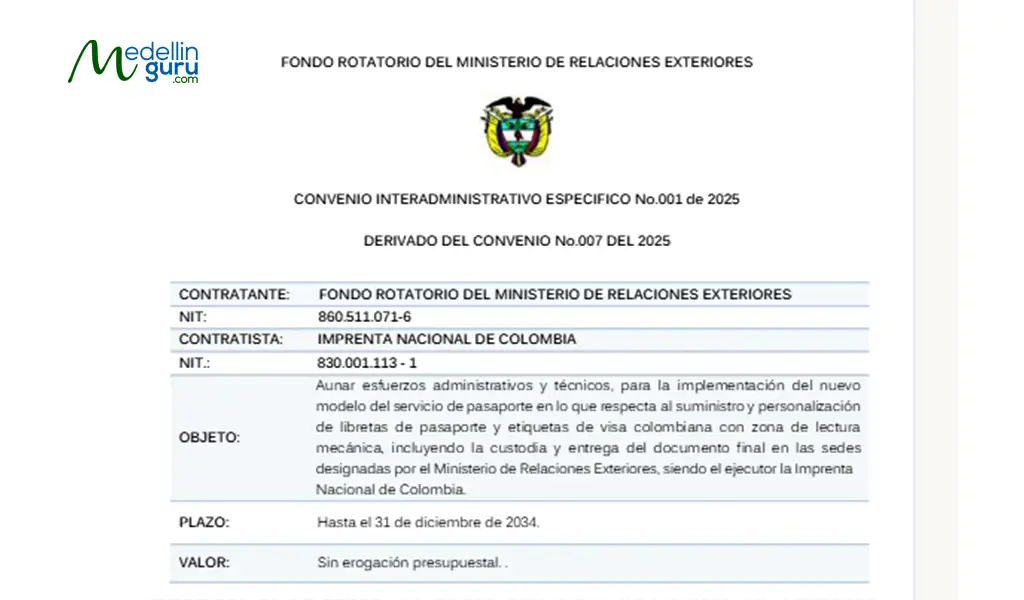
What Will Occur With Portugal?
Caracol Radio reported that a government delegation will travel to Portugal in the coming hours to sign a cooperation agreement with that country and initiate the implementation of the new passport model.
This contract would be executed starting April 1, 2026, and at the same time, the National Printing Office will be responsible in Colombia, as indicated by the agreement signed with the Ministry of Foreign Affairs.
Sources tell Caracol Radio that between September 1, 2025, and April 1, 2026, the Government will sign a new urgent contract with Thomas Greg & Sons, which will run until March 2026. Additionally, a budget increase will be made to the current contract with this company to prevent passports from expiring.
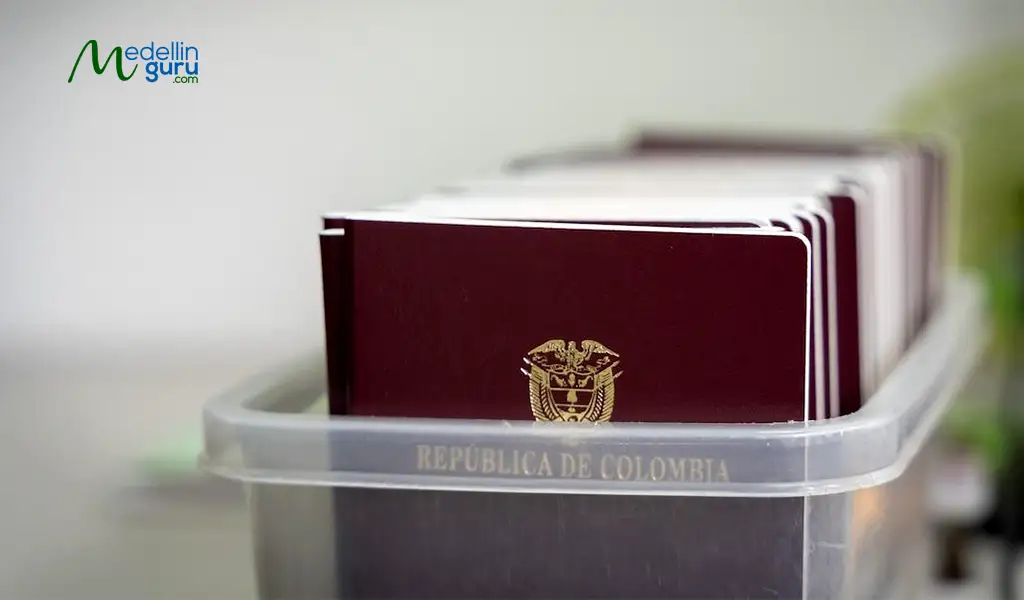
The Bottom Line: Is the MRE’s Crisis Ending? New Chancellor Elected & Passport Expectations
With the election of a new Chancellor, Colombia’s Ministry of Foreign Affairs (MRE) is poised to address its ongoing passport crisis and persistent service challenges. This leadership change sparks hope for a resolution to the operational woes and contract controversies that have plagued the MRE — with expectations for improved efficiency across all Cancillería services and a positive impact on Colombia’s international standing, helping the country overcome an urgent situation that affects both locals and expats.
Medellin Guru Social media
Be part of our community. Find out about news, participate in events and enjoy the best of the city.
Medellin Guru's comprehensive visa and passport series
The Colombian visa changes that went into effect in October 2022 were significant. So, on the Medellin Guru site, we have a comprehensive series of visa articles that are kept up-to-date and should answer most visa questions. These articles include:
- Colombia Visa Guide: Ultimate Guide How to Get a Colombian Visa
- How to Obtain a Colombian Visa with Up-to-Date Info – an overview of all the Colombian visas
- Popular Colombian Visas for Foreigners: Which Visa is the Most Popular?
- Coronavirus Impacts on Colombian Visas and Tourist Visas
- Visa Agencies: A Guide to Visa Agencies in Medellín and Colombia
- 9Common Colombian Visa Mistakes: How to Avoid Them
We have looked in detail at the nine most popular Colombian visas used by foreigners:
- Digital Nomad Visa
- Retirement visa
- Marriage visa
- Investment visa
- Business Visa
- Resident visa
- Work visa
- Student visa
- Visitor visa
Also, we have looked in detail at three additional Colombian visas, which are less popular for foreigners:
- Rentista visa (annuity visa) – for foreigners with a fixed income
- Beneficiary visa – for relatives of visa holders
- Expertise visa – for professionals
In addition, we have a guide to Colombia tourist visas and how to extend a tourist visa. Also, we have a guide to renewing U.S. passports in Colombia and a guide to obtaining a Colombian passport.
Furthermore, we provide information about travel health policy that meets the health requirement for Colombian visas. And we have a guide to how apply for a cedula extranjeria in Colombia and a guide to using notaries in Medellín and Colombia. Finally, Medellin Guru has partnered with a visa agency to offer Colombia visa services.
All of our Colombia visa articles are up to date (2024) and constantly receive updates in 2025.
The Bottom Line: Is the MRE’s Crisis Ending? New Chancellor Elected & Passport Expectations
With the election of a new Chancellor, Colombia’s Ministry of Foreign Affairs (MRE) is poised to address its ongoing passport crisis and persistent service challenges. This leadership change sparks hope for a resolution to the operational woes and contract controversies that have plagued the MRE — with expectations for improved efficiency across all Cancillería services and a positive impact on Colombia’s international standing, helping the country overcome an urgent situation that affects both locals and expats.
Medellin Guru Social media
Be part of our community. Find out about news, participate in events and enjoy the best of the city.


